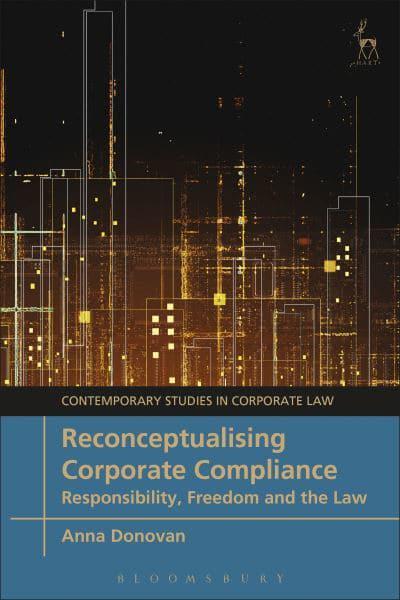Reconceptualising corporate compliance
responsibility, freedom and the law
- ISBN: 9781509946662
- Editorial: Hart Publishing
- Fecha de la edición: 2023
- Lugar de la edición: Oxford. Reino Unido
- Colección: Contemporary Studies in Corporate Law
- Encuadernación: Rústica
- Medidas: 24 cm
- Nº Pág.: 272
- Idiomas: Inglés

This book offers a comprehensive examination of the issues surrounding corporate compliance. Should corporations comply with the spirit or the letter of the law? What role does compliance play in a capitalist market economy? Why is it that otherwise law-abiding citizens are willing to implement corporate compliance strategies that are seemingly at odds with their personal values? Dr Donovan responds to these questions and more, providing a persuasive argument for the legitimate role of spirited compliance within a market economy. In doing so, she employs the lens of classical liberal ideology, challenging the widespread view that technical compliance is simply 'capitalism.' In an examination that has relevance beyond the compliance arena, the author also explores how the architecture of the firm facilitates the often atypical compliance decisions that individuals make when acting within a corporate setting. The book draws on social psychology to offer important insights into how the often-elusive goal of corporate behavioural change can be achieved, for the benefit of both the market and society as a whole. Joint runner-up of the 2021 SLS Peter Birks Prize for Outstanding Legal Scholarship.
CONTEXT
1. Capitalism's Compliance Crisis
I. Why Narrative Matters
II. The Consequences of Creativity: What Harm is it Really?
III. Recontextualising Compliance: From Subject to System 0
IV. Scope of the Book
V. Structure of the Book
VI. Conclusion
2. Creative Compliance in Practice
I. The Rise and Rise of Creative Compliance
II. Loopholes in the Law: A Focus on Tax Avoidance
A. Towards a Judicial Anti-Avoidance Doctrine?
B. The 2012 Tax Scandals
III. The (Current) Limitations of Legislation
IV. Conclusion
3. Constructing Compliance: Freedom to Choose?
I. The Social Construction of (Creative) Compliance
A. Social Constructionism: Driving Divergent Definitions
B. Intra-Group Convergence: Habitualisation and Isomorphism
C. The Implications of Compliance as a Social Construct
II. The Meaning and Influence of Norms
A. Defining 'Norms'
B. The Behavioural Impact of Norms
C. The Interaction between Descriptive and Injunctive Norms
III. The Homogeneity of Corporate Norms
A. The Expressive Function of Law
B. The Dominance of the Shareholder Wealth Maximisation Norm
IV. The Function of Norms: Free to Choose?
A. Norms and Freedom of Choice: Taxes and Subsidies
B. Influencing Norms to Influence Behaviour
V. Conclusion
4. Motivating Compliance: Freedom to Act?
I. Deterrence-Based Compliance: Motivating 'Amoral Calculators'
A. It's Called Capitalism … Again
B. Explanatory Limitations of a Deterrence-Based Approach
C. Regulatory Relationships and Practical Challenges
D. Retaining a Role for Deterrence?
II. Legitimacy-Based Compliance
A. Legitimacy-Based Compliance
B. Procedural Justice: The Legitimacy of the Originating Authority
C. Procedural Justice: The Legitimate Exercise of Authority
D. The Duality of Authority
III. Legitimising Creative Compliance: Dissonance Reduction and Over-Rationalisation
A. The Duality of Norms
B. The Salience of Corporate Norms
C. Cognitive Dissonance and Over-Rationalisation
IV. The Compliance Degeneration Cycle
A. Stage One: Initial Drivers of Creative Compliance
B. Stage Two: Undermining Legitimacy
C. Stage Three: Illegitimacy and Creative Compliance
V. Conclusion
PART II
THE CASE FOR REFORM
5. Compliance, Predictability and the Market Order
I. (Mis)Conceptions of the 'Liberty Tradition' 2
A. Perceptions of Self-Interest and Illegitimate Government Interference
B. The Emergence of 'Everyday' Liberalism
II. Defining (and Constraining) Freedom within the Classical Tradition
A. Freedom of the Individual
B. Limited State Interference
C. Dispelling the Paradox: Individualism and Cooperation
III. In Defence of the Market Order
A. The Market as a Conduit of Knowledge
B. Conveying Knowledge Through the Price Mechanism
C. Polycentric Systems and Market Order
IV. Complex Systems and Spontaneous Order
A. The Architecture of Order
B. Predictability, Order and the Rule of Law
V. Conclusion
6. The (Ostensible) Equality Paradox: Privilege and Obligation
I. Defining 'Equality' before the Law
A. The Rule of Law: Precepts and Conceptions
B. Equality of Law, not Outcome
C. The Rule of Law: Between Thick and Thin Conceptions?
II. Constraining 'Lawful' Conduct
A. Equality as a Meta-Legal Principle
B. A Positive Obligation to Maintain Equality before the Law?
III. Inequality and Legal Privilege
IV. Conclusion
PART III
BARRIERS TO REFORM
7. A Person without Personality: The Fiduciary Ladder of Corporate 'Personhood'
I. Separate Personality, Limited Liability and the Reification of the Corporation
II. Redefining the Beneficiary: From 'Company' to 'Market'
A. Shareholder Wealth Maximisation as a Proxy for Rentier Shareholders
B. Distorting Fiduciary Duties; the Changing Status of the 'Company' Beneficiary
III. The Corporate Fiduciary Ladder
A. The Structure of the Fiduciary Ladder
B. The Psychological Consequences of the Fiduciary Ladder
C. Responding to the Fiduciary Ladder
IV. Contrasting Other Actors
V. Conclusion
PART IV
REFORM
8. It is Called Capitalism: Towards a New Market Integrity
I. Responsibility, Freedom and the Law
A. Market Order, Integrity and Freedom
B. Freedom, Choice and Responsibility
II. Radical Integrity
A. Towards a More Radical Integrity
B. A Roadmap for Reform
III. Conclusion






